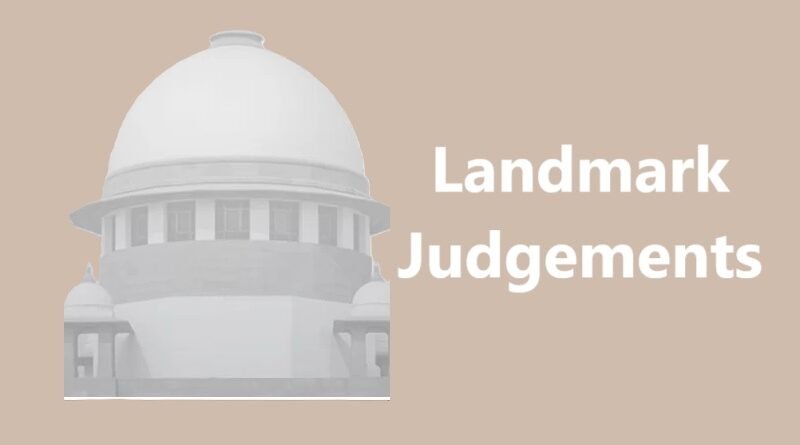Kihoto Hollohan v. Zachillhu (1992): A Landmark Judgment on Anti-Defection Law
Introduction
Kihoto Hollohan v. Zachillhu (1992) is a landmark case in Indian constitutional law that dealt with the interpretation and validity of the Tenth Schedule of the Indian Constitution, which pertains to the anti-defection law. The Supreme Court’s ruling in this case established crucial principles regarding the power of the Speaker in disqualification matters and judicial review.
Background of the Case
The anti-defection law was introduced by the 52nd Amendment to the Indian Constitution in 1985 to curb political defections by legislators, which were undermining the stability of elected governments. This amendment added the Tenth Schedule to the Constitution, outlining the grounds for disqualification of legislators who defected from their parties.
Under this law, the Speaker or Chairman of the respective House was given the authority to decide on matters of disqualification. However, concerns arose regarding the concentration of power in the hands of the Speaker, leading to legal challenges.
Issues Raised
The key issues in Kihoto Hollohan v. Zachillhu were:
- Whether the Tenth Schedule violated the basic structure of the Constitution by affecting the democratic rights of legislators.
- Whether the Speaker’s role in deciding disqualification cases was subject to judicial review or whether it was beyond the scrutiny of the courts.
- Whether the provisions of the Tenth Schedule were violative of fundamental rights, particularly Article 14 (right to equality) and Article 19 (freedom of speech and expression).
Arguments Presented
Petitioners’ Arguments:
- The Tenth Schedule conferred excessive power on the Speaker, who is often a member of a political party, thus raising questions of impartiality.
- The exclusion of judicial review in disqualification matters violated the principles of democracy and fairness.
- The provisions restricted the freedom of speech and expression of legislators, as they could not dissent against their party without risking disqualification.
Respondents’ Arguments:
- The anti-defection law was necessary to prevent political instability and uphold the integrity of the electoral process.
- The Speaker’s authority in such matters was justified, as the officeholder was expected to act impartially.
- Judicial intervention in legislative matters could disrupt the smooth functioning of the legislature.
Judgment and Rationale
The Supreme Court, in a 3:2 majority judgment, upheld the constitutional validity of the Tenth Schedule but introduced certain safeguards to prevent misuse of power. The key rulings were:
- Tenth Schedule is constitutionally valid: The Court ruled that the anti-defection law does not violate the basic structure of the Constitution. It was a necessary measure to curb political corruption and ensure stability in governance.
- Judicial review is permissible but limited: The Court held that while the Speaker’s decision on disqualification is final, it is not immune from judicial review. Courts can intervene if the Speaker’s decision is found to be mala fide, biased, or violating constitutional provisions.
- Speaker’s role is subject to scrutiny: While the Speaker was granted the authority to decide disqualification cases, the Court recognized the potential for bias and allowed judicial review to ensure fairness and impartiality.
- Freedom of speech is not absolute in legislative matters: The Court clarified that the Tenth Schedule does not violate Article 19(1)(a), as reasonable restrictions on legislators’ conduct were necessary to maintain party discipline and prevent opportunistic defections.
Significance of the Judgment
- Strengthened Parliamentary Democracy: The ruling reinforced the anti-defection law as a crucial tool to prevent political instability caused by frequent defections.
- Balanced the Power of the Speaker: By allowing judicial review, the Court ensured that the Speaker’s decisions could be challenged in cases of bias or unfairness.
- Impact on Political Dynamics: The judgment influenced the functioning of legislatures, making party loyalty a legal obligation and limiting the scope for defection.
- Foundation for Future Judicial Decisions: Subsequent cases have relied on this judgment to determine the scope of judicial intervention in legislative matters.
Conclusion
Kihoto Hollohan v. Zachillhu (1992) remains a pivotal decision in Indian constitutional law. It upheld the validity of the anti-defection law while ensuring that the Speaker’s powers were not absolute. By allowing judicial review in cases of bias or unfair decisions, the ruling struck a balance between legislative authority and constitutional safeguards. This case continues to be a cornerstone in debates on political defections, party discipline, and democratic governance in India.
Recommended:
1. Kesavananda Bharati v. State of Kerala (1973)
2. Maneka Gandhi v. Union of India (1978)


Pingback: 25 Important Supreme Court Judgements - Indian Polity - Bharat Articles
Pingback: Landmark Judgments in India - Bharat Articles